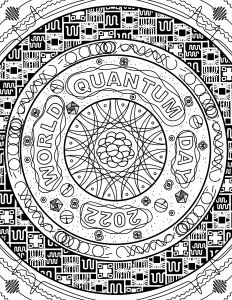Even quantum physicists do not understand quantum physics, or so the saying* goes.
“The worst grade I ever got in any class was my first quarter of quantum mechanics, because it just was weird and I didn’t understand it and I couldn’t get my head around it,” says Shimon Kolkowitz, a UW–Madison physics professor with the Wisconsin Quantum Institute (WQI), who now conducts research in quantum sensing. “It is something you develop some kind of feeling and intuition for over time, so it’s my personal feeling, and the feeling of many, that it’s important to start exposing people to these concepts much earlier [than in college].”
Quantum science is weird because it explains the workings of our world at the sub-atomic level. The classical physical world we experience and understand — the predictable trajectory of a baseball in the air or the Earth rotating around the sun — breaks down at these tiny scales.
Understand it or not, quantum science is here to stay.
“Quantum science is a rapidly-growing area of research and industry, and it’s going to have a number of major impacts on any number of different areas of commerce,” Kolkowitz says. “There’s a huge need to train a growing quantum workforce that can participate in, engage with, and develop these new technologies.”

The first-ever World Quantum Day, to be celebrated annually on April 14, is an international, community driven event to spark interest and generate enthusiasm for quantum mechanics. A goal of World Quantum Day is to promote public awareness of the positive impact quantum science has had and will have on society. [The date is taken from Planck’s constant, 4.14 * 10-15 eV · s, a value that is used in many quantum mechanics equations.]
“It’s a day to engage people in quantum science and let them know what is going on in current research, but it’s also a chance to demystify and make quantum science more accessible and available,” says Mallory Conlon, a quantum science outreach coordinator at UW–Madison.
Conlon is working with QuanTime, an educational initiative developed by leading quantum institutions to introduce quantum activities to middle and high school students. Anyone can play QuanTime’s online games, where they will learn about principals such as entanglement and superposition. There is even a quantum chess game.

“We also have Wonders of Quantum Physics electron transition kits, and we’re sending out nearly 1000 kits to classrooms across the country,” Conlon says. “It’s an inquiry-based activity where participants learn how we can use light to manipulate atoms and electrons, which is really the underpinnings of how quantum computers work.”
The physics department and WQI will also be celebrating WQD by highlighting several quantum science researchers and sharing the top five quantum stories from the past year on social media. Follow along on Twitter and Instagram (both @UWMadPhysics) to learn more about the exciting quantum research being done at UW–Madison.
There is also a WQD coloring page made by physics grad student Aedan Gardill available for download.
UW–Madison and WQI are members of the Chicago Quantum Exchange, the NSF-funded Quantum Leap Challenge Institute HQAN, and the Department of Energy’s National Quantum Information Science (QIS) Research Center Q-NEXT, three collaborative efforts that are advancing quantum information science and engineering, especially in Great Lakes region. Learn more about the research happening across our collaborations by searching #MidwestQuantum on social media.
* Borrowed from quantum physicist Richard Feynman’s quote: “I think I can safely say that nobody understands quantum mechanics.”